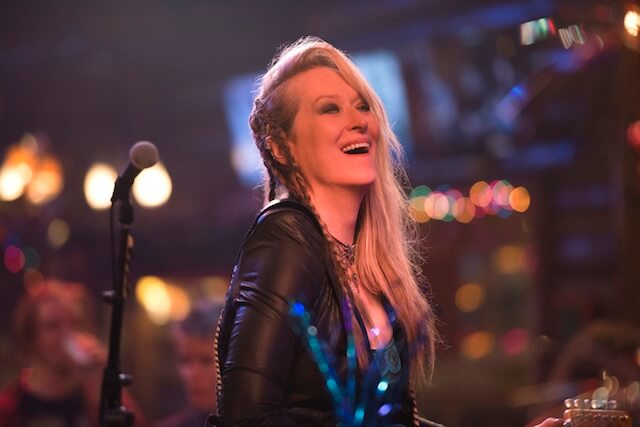‘Ricki and the Flash’ In “Ricki and the Flash,” Meryl Streep plays the kind of person society likes to forget: the woman who walked away from her children at a young age to pursue a foolish dream, one that didn’t have the nerve to come true. When we first see Ricki, real name Linda, she’s playing with her band in a bar that’s maybe a quarter filled. As far as purgatories go it’s not bad: the paltry patrons are into it as they play covers — mostly dad rock with the occasional sop to the youngs. Pierced, tattooed and bejeweled, one side of her head tied up in endless braids, she daylights at a pricey supermarket and is about to declare Chapter 11, but she’s coasting in a way that to her is mostly harmless. When pressed she regrets nothing. “Ricki and the Flash” is the story about how she reacts to being sucked into her old world, which of course is considerably moneyed. Her ex, the touchingly square Pete (Kevin Kline), wants her to fly out to his cloistered community manse to look after their daughter, Julie (Streep’s real, also gifted daughter Mamie Gummer), who’s fresh off a divorce and a disheveled wreck who hasn’t changed out of her X shirt in days. There are insurmountable tensions afoot, and it’s hard to take a side between our protagonist — giggly, stubborn yet gregarious, if not with things that require money — and the estranged family that has every right to look at her cross-eyed. RELATED: Our review of “Into the Woods,” co-starring Meryl Streep Thing is, “Ricki and the Flash” doesn’t want you to take sides. It’s in essence a hangout movie, burning with a goofy humanism that comes from Diablo Cody’s script but even moreso from Jonathan Demme, its director. It’s an odd fit, the snarky author of “Juno” and the enjoyably sour “Young Adult” with the warm soul of “Something Wild.” But her script is surprisingly delicate and open to the complexities of difficult relationships. Midway through Ricki shares an uneasy stand-off with the mother who replaced her (Audra McDonald), and the exchange lets both have their say before things boil over into verbal assaults, though ones you know both will soon regret. Demme simply makes Cody’s script even more humane, letting the characters and actors spend time with each other and eventually unite under a groove. That doesn’t mean it’s happily ever after. Cody has Ricki ejected from the home she abandoned earlier than expected, and even when belatedly reunited things remain tense. Pete, who finds himself hesitantly re-melting to his longtime ex’s charms, is largely absent from the second half — a bit of a bummer, considering how effortless Kline is at quietly telegraphing pain through good cheer. (He’s nearly as moving as Bill Irwin was in a superficially similar role in Demme’s “Rachel Getting Married.”) But Pete’s inability to flip-flop for an old flame is more realistic to how the heart works. Ricki, meanwhile, is an important character to see in a film, especially since this kind of medium-range dramedy now only gets a wide release if it stars someone like Streep. A sometimes overly-technical actress, she can be a bit much in the early stretch, though you could easily read that as Ricki being nervous to reconnect and feeling like an unwanted guest in someone’s house. But Streep chills out around the time Ricki does the same, thanks in part to a lover/lead guitarist played with disarming puppydog-ness by Rick Springfield. From then to the end, Streep’s face, plus her sing-songy line delivery, becomes a barometer for rich, specific, rarely shown feelings. Ricki isn’t desperate to be loved; she’s desperate to be tolerated. She knows she can’t fully win back the kids she abandoned, so she’ll settle for something considerably less. The film around her becomes about moments of transcendence, of losing one’s self in music, even if they’re just Springsteen or Pink covers, or interaction, even if it’s with someone who will never be sure if they can trust her. “Ricki and the Flash” can be spotty, but there are many, many times when it seems great.
Director: Jonathan Demme
Stars: Meryl Streep, Mamie Gummer
Rating: PG-13
3 (out of 5) Globes
‘Ricki and the Flash’ stars Meryl Streep as a rock god who never made it

Sony
Follow Matt Prigge on Twitter @mattprigge


















